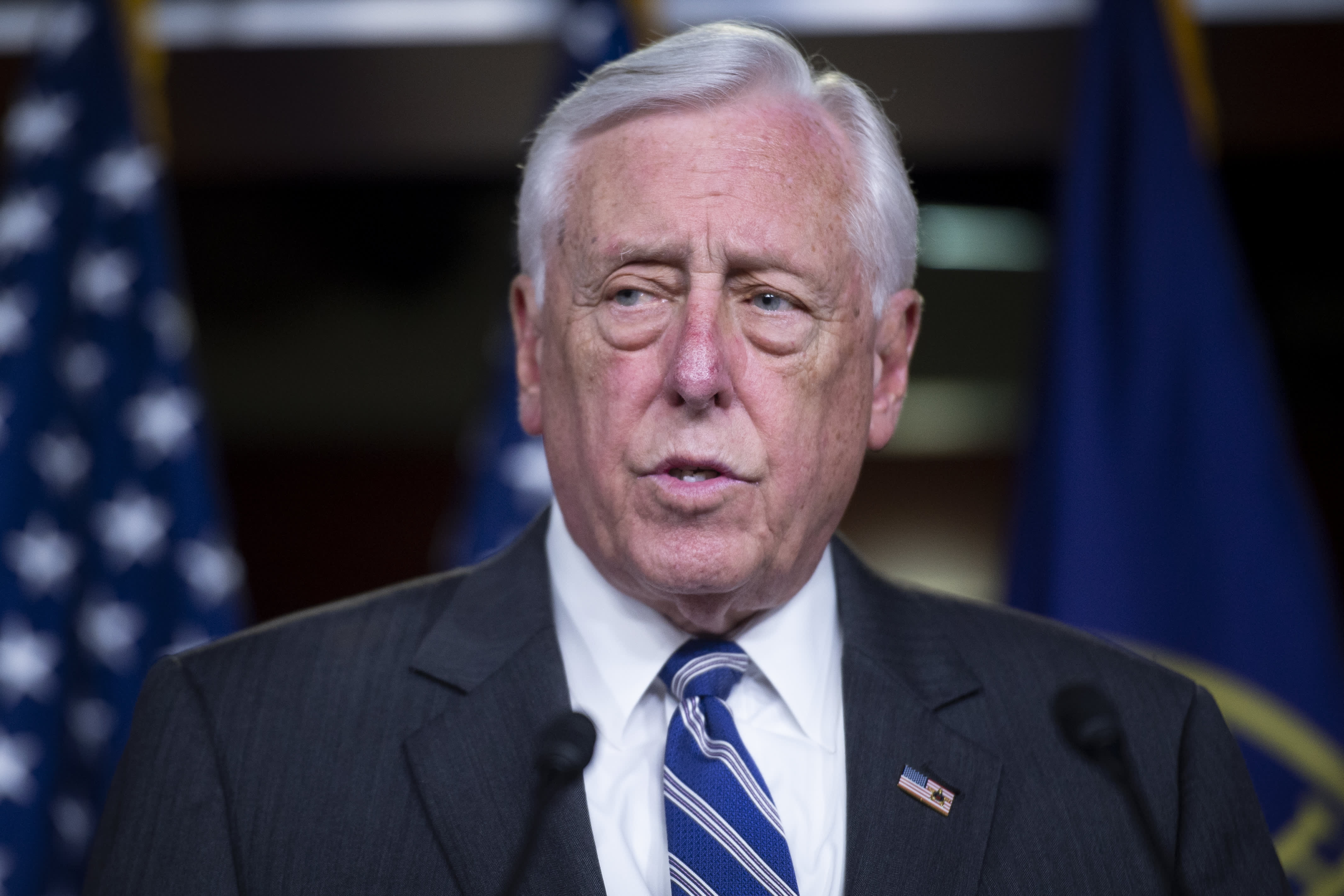House Majority Leader Steny Hoyer, D-Md., speaks during a news conference calling for the removal of a bust from the Capitol of Chief Justice Roger Taney in Washington on Monday, March 9, 2020.
Caroline Brehman | CQ Roll Call | Getty Images
Democrats have started to lay the groundwork to pass the next coronavirus relief package without Republican votes as GOP lawmakers criticize the cost of President Joe Biden‘s rescue plan.
House Majority Leader Steny Hoyer, D-Md., added votes to the chamber’s schedule next week “that will give us the option of using budget reconciliation to advance a COVID-19 relief package,” he told lawmakers Tuesday night. The thorny process would allow Democrats to pass a pandemic aid bill by a simple majority vote in the Senate with no Republican support.
Hoyer did not explicitly say Democrats will opt to use reconciliation, as the Biden administration holds talks with centrist GOP lawmakers it hopes will vote for a relief measure. Still, the moves to set up the process suggest the party has doubts about Republicans providing the votes to approve a rescue package.
The House majority leader told lawmakers he could change the schedule again before March 14 to allow time to renew programs to boost unemployed workers during the pandemic. Both the $300 per week federal jobless benefit supplement and the Pandemic Unemployment Assistance program formally expire that day.
Biden and Democrats have pushed to inject more money into the health-care system and economy as the virus kills more than 3,000 Americans per day on average and the country takes on the biggest vaccination effort in history. Biden’s $1.9 trillion rescue plan aims to speed up vaccinations and send more money to individuals, small businesses, and state and local governments.
A painting of Abraham Lincoln is seen as US President Joe Biden speaks on Covid-19 response in the State Dining Room of the White House in Washington, DC on January 26, 2021.
Mandel Ngan | AFP | Getty Images
Republicans and a few Democrats in Congress have questioned the need to spend so much money about a month after a $900 billion relief plan became law. GOP skeptics have called for a smaller bill based around vaccine distribution funds.
But after a stalled congressional response in the second half of last year that allowed millions to fall into poverty and exacerbated the worst U.S. hunger crisis in decades, Democrats say Congress cannot spend too much money. Treasury Secretary Janet Yellen told lawmakers earlier this month that “with interest rates at historic lows, the smartest thing we can do is act big.”
Democratic leaders have said they will push ahead even without Republican support.
“If our Republican colleagues decide to oppose the necessary, robust, Covid relief that is needed, we will have to move forward without them. It is not our preference,” Senate Majority Leader Chuck Schumer, D-N.Y., said Wednesday.
He added that Congress should not “repeat the mistakes of 2008 and 2009,” when he said lawmakers were “too timid” in responding to the global financial crisis.
On Monday, Biden said the decision to use reconciliation “will depend upon how these negotiations [with Republicans] go.” He indicated it could take “a couple of weeks” to know whether GOP lawmakers would back a relief plan.
Senate Minority Leader Mitch McConnell, R-Ky., said Monday that the Biden proposal “misses the mark.”
The risks with budget reconciliation
Both House Budget Committee Chairman John Yarmuth, D-Ky., and incoming Senate Budget Committee Chairman Bernie Sanders, I-Vt., have said they are prepared to pass budget resolutions that would start the reconciliation process. Sanders has not taken control of the panel yet as Schumer and McConnell try to finalize a deal establishing rules for a 50-50 Senate.
While it offers the ability to pass a bill with a simple majority in the Senate, reconciliation comes with its own headaches for Democrats.
The process only applies to bills that change spending and revenue levels, and restricts what lawmakers can put into legislation. Democrats may not fit all of their priorities into a final product that complies with Senate rules.
The party also may have to tweak the bill to avoid defections. Sen. Angus King, a Maine independent who caucuses with Democrats, questioned the Biden plan’s cost after 16 bipartisan senators met with White House officials on Sunday.
Sen. Joe Manchin, D-W.Va., has called for the $1,400 direct payments in the bill to be more narrow in scope. Both Biden and top economic advisor Brian Deese have signaled they are open to changing eligibility for the next round of checks.
The bipartisan House Problem Solvers Caucus also talked with Deese on Tuesday about a relief bill. While the group’s co-chairs, Reps. Josh Gottheimer, D-N.J., and Tom Reed, R-N.Y., said after the meeting that they wanted to find a bipartisan solution, it was unclear if any of the group’s 28 Democratic members were prepared to oppose Biden’s plan.
The Senate also faces time constraints as it tries to pass a relief bill. The second impeachment trial of former President Donald Trump will start in about two weeks, and Senate leaders have not said how long they expect it to last.
The chamber also aims to confirm more of Biden’s Cabinet nominees in the coming weeks.
